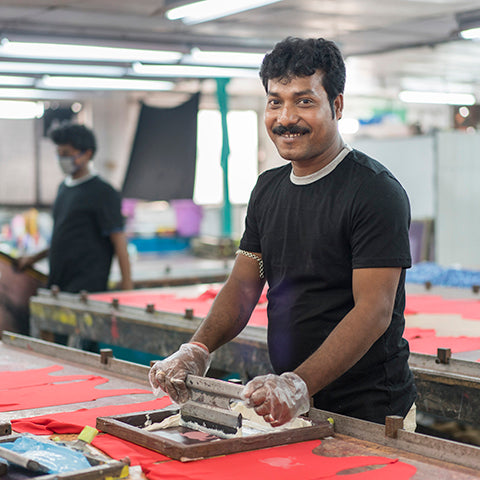The covid-19 pandemic has affected us all, deeply, and in so many different ways. Like many others, the garment industry has been greatly impacted. Just this month, several major American clothing companies have announced they are filing for bankruptcy, including Lucky Brand, Brooks Brothers, Ann Taylor, LOFT, Lane Bryant, Lou & Grey, and Justice. To minimize their losses by shifting the financial burden of the crisis down to the bottom of the supply chain, major clothing brands and retailers are canceling factory orders right and left, leaving millions of low-paid and mainly female garment workers out of work and destitute.
In India, where Mightly’s fair trade clothing is produced, the situation is especially bad for migrant workers, who are also left homeless without a way to get back to their villages. Young women, who often use garment factory jobs as often the first opportunity to work, achieve economic independence, and defer marriage, have also suffered disproportionately. Where factories remain open, many workers report being forced back to work without adequate precautions, even in the United States.
In this time of crisis, fair trade apparel is more important than ever. When you see a product with the Fair Trade Certified™ seal, you can be sure it was made according to rigorous social, environmental, and economic standards. Mightly, Inc., was founded in 2019, with the idea of bringing certified organic, fair trade children’s clothing to market, at prices parents could afford. Our first fair trade collection debuted in 2020, and 100% of Mightly’s organic clothing will be Fair Trade Certified™ by winter 2020.
 Fair Trade business relationships are true partnerships, which require joint problem solving and brands and factories both being willing to prioritize long term business relationships and worker protections over maximizing profits. The garment factory in Kolkata, India, where Mightly’s clothing is produced, Rajlakshmi Cotton Mills (RCM), was one of the first factories in the world to achieve Fair Trade Certification. In contrast to those factories working with – and having orders canceled by – major retailers, RCM, which works exclusively with ethical clothing brands, has not had any orders cancelled and has been able to continue to provide employment for their workers. "When I talk to other workers, friends from other factories, they're always very curious about the Fair Trade program we have and ask how they can join specifically because of the Fair Trade premium program." says Tharun Sardar, a screen printer who has worked at RCM for 6 years.
Fair Trade business relationships are true partnerships, which require joint problem solving and brands and factories both being willing to prioritize long term business relationships and worker protections over maximizing profits. The garment factory in Kolkata, India, where Mightly’s clothing is produced, Rajlakshmi Cotton Mills (RCM), was one of the first factories in the world to achieve Fair Trade Certification. In contrast to those factories working with – and having orders canceled by – major retailers, RCM, which works exclusively with ethical clothing brands, has not had any orders cancelled and has been able to continue to provide employment for their workers. "When I talk to other workers, friends from other factories, they're always very curious about the Fair Trade program we have and ask how they can join specifically because of the Fair Trade premium program." says Tharun Sardar, a screen printer who has worked at RCM for 6 years.
In addition to providing personal protective equipment for workers, many fair trade factories have used the Fair Trade Premium to deploy emergency cash payouts to workers affected by the covid-19 crisis and government shutdowns for groceries, rent, school fees, and hygiene products. To learn more about how to support fair trade factories and workers, Fair Trade USA has a Covid-19 response program. 



